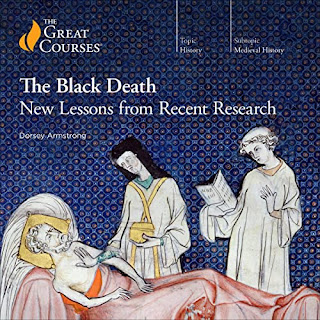 Title: The Black Death: New Lessons from Recent Research
Title: The Black Death: New Lessons from Recent ResearchAuthor: Dorsey Armstrong
Publication: May 20, 2022 by The Great Courses
Genre: Nonfiction, History, Science
Find it on: Audible
Rating: 4/5★
The world has been fundamentally changed by the shock and devastation of a 21st century pandemic. COVID-19 has claimed six million lives; we process a daily deluge of often conflicting and/or overwhelming information; and humanity has no way of knowing when this collective trauma will finally end. Will our lives ever be the same again? It seems not.
Now, try to imagine the plague that devastated Europe in the Middle Ages and beyond: more than 25 million dead. Almost 400 years of outbreaks caused by a bacterium that would not be identified until the 19th century. The mortality rate was close to 85%, with as much as 70% of the population wiped out in some locations. Superstition was pervasive, and medical practices were frequently ineffective and harmful. What caused this tragedy, and what could have been done about it? For years, we thought we knew … but we often had it wrong.
In The Black Death: New Lessons from Recent Research, celebrated medievalist Dorsey Armstrong shares the fascinating new story of this old pandemic—revealed by dedicated researchers working with 21st-century technologies and a knowledge of language and history that now provide input from all geographic areas of the medieval world. In seven engaging lectures, Professor Armstrong corrects explanations of the pandemic that are now known to be inaccurate and offers a more robust description of plague biology than has ever been known. COVID-19 isn’t likely to be humanity’s last experience with a zoonotic disease, so what can we learn now from these two pandemics that could help us in the future?

This is a course by Dr. Dorsey Armstrong, who’s a professor of English and Medieval Literature. This audiobook (part of The Great Courses) is a follow up of professor Armstrong’s previously published course in 2016 ‘The Black Death: The World’s Most Devastating Plague’. Since 2016 new research has developed and some different facts have come to light that professor Armstrong wants to shed a new light on, especially in the wake of the Covid pandemic.
At 2 hrs and 43 mins, this is a quick and smooth audiobook to listen to, especially with professor Armstrong herself as a narrator. I’ve listened to three other courses of hers (Great Minds of the Medieval World, Powerful Women of the Medieval World and Medieval Myths & Mysteries), which I would all very much recommend. I also appreciate that she gives us some updates on the research, which I think should happen more often with these kind of audiobooks.
In the 2016 course it was stated that Siege of Caffa (which was led by Khan Jani Beg from 1345 to 1347) was to blame for the black death of 1346 arriving in Europe but with the new research this has been proven wrong. I find it actually really exciting that as technology advances that researchers can validate or in this case rebut things that were previously states as facts. And who knows what the research will say in a couple of more years?!
Professor Armstrong’s input about the Covid-19 pandemic was also very interesting to hear. Some reviewers have found this to be too woke or political, which I just can’t fathom because what the hell is political about a pandemic that has killed millions of people? Anyways, I found all the lectures very informing, fascinating, insightful and very easy to listen to. I’m already looking forward to professor Armstrong’s the next course, whatever the topic may be.

About the author:
Receiving her Ph.D. from Duke University in 1998, Professor Armstrong specializes in Middle English Language and Literature, Arthurian Literature, Anglo-Saxon Language and Literature, and Gender and Feminist Studies. She taught at Centenary College of Louisiana and California State University, Long Beach before joining the Purdue English Department. She has published extensively on Arthurian literature, Malory’s Morte Darthur, and William Caxton, with articles appearing in Arthuriana, Arizona Studies in the Middle Ages and Renaissance, Bibliographical Bulletin of the International Arthurian Society, Essays in Medieval Studies, Exemplaria, and various essay collections. Her book, Gender and the Chivalric Community in Malory’s Morte d’Arthur, was published in 2003 by University Press of Florida. Her modern English translation of Malory’s Morte Darthur appeared in 2009 from Parlor Press. Professor Armstrong is editor-in-chief of the academic journal Arthuriana, and sits on the board of directors of TEAMS (the Consortium for the Teaching of the Middle Ages). Her current book project is a study of the role geography and fifteenth-century politics played in shaping Malory’s Morte Darthur.



This sounds fascinating! And I like the idea of the author using Covid as part of her lecture, tying the past to the present. Awesome review😁
And she did it brilliantly. Hated seeing reviews being like wheeeh she got political. Crybabies…
That’s what’s so interesting about history, the way it repeats itself, and we need to learn from it!
We’re in one big loop!
This sounds like a fascinating listen, and I love that the author updates her courses with new information and linked this one to a recent event like Covid.